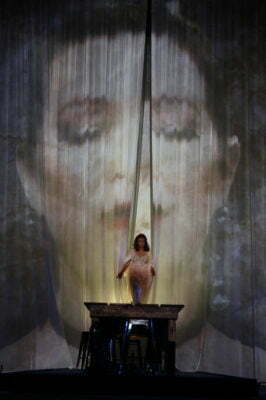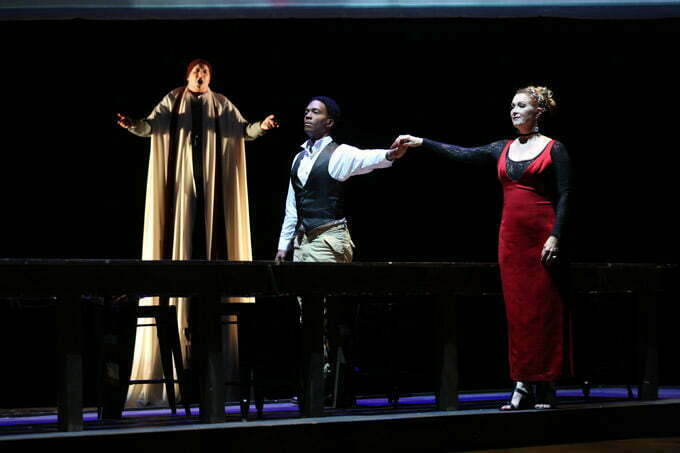Macbeth
Directed by Andreas Mitisek
Composed by Ernest Bloch
Libretto by Edmond Flegg after Shakespeare
At Harris Theater
A long overdue debut from a neglected master
Prolific and respected a composer as he was, Bloch only composed one opera in his long career. Typical of his style it incorporates flourishes of his admired antecedents —notably Strauss and Wagner—into a streamlined Symbolist-styled piece that fits perfectly with one of Shakespeare’s most psychologically twisted works.
Equally streamlined is Mitisek’s direction. Sparsely staged and with a few parts condensed, most of the embellishment is reserved for the music itself. The Apollo Chorus and Chicago Sinfonietta—under Stephen Alltop and Francesco Milioto, respectively—add the necessary richness and depth, particularly in the end scene crescendo. Mitisek oversaw what was billed as the US premiere in 2013 at the Long Beach Opera.
Chicago Opera has resurrected this forgotten gem—one of Mitisek’s favorite things to do—for only four performances. They bring a degree of sensuality that I would imagine was missing from the 1910 debut. Lady Macbeth (Soprano Suzan Hanson) positively oozes sex. She and her king (Baritone Nmon Ford) engage in both consensual and—shockingly–non consensual copulation.
Bloch’s winnowing of the tale from five to three acts (seven scenes) also exaggerates the gradual transposition of Macbeth’s early “milk of human kindness” with his wife’s ruthlessness for power. Much of Shakespeare’s dialogue is directly sourced, including everyone’s nihilistic favorite “Tomorrow and..” soliloquy.
 Ford’s youthful baritone is redolent as he believably conveys his character’s horrific rise to hubris in a beautiful complement to Hanson. She sometimes rises to the level of a truly Wagnerian vibrato (i.e., a tad shill), but that’s totally in sync with the histrionics of her character and is therefore completely acceptable. As the witches, Brittany Loewen, Helen Wyatt and Cassidy Smith are transformed into brazen hussies as a chorus of soprano and mezzo-sopranos. Macduff doesn’t have much of a role but Paul Scholten shines in the spotlight, while Joe Shadday excels at the far trickier job of distinguishing himself as Banquo and three others.
Ford’s youthful baritone is redolent as he believably conveys his character’s horrific rise to hubris in a beautiful complement to Hanson. She sometimes rises to the level of a truly Wagnerian vibrato (i.e., a tad shill), but that’s totally in sync with the histrionics of her character and is therefore completely acceptable. As the witches, Brittany Loewen, Helen Wyatt and Cassidy Smith are transformed into brazen hussies as a chorus of soprano and mezzo-sopranos. Macduff doesn’t have much of a role but Paul Scholten shines in the spotlight, while Joe Shadday excels at the far trickier job of distinguishing himself as Banquo and three others.
Every eager to try new theatrical technology and create fascinating tableaux (as in Fall of the House of Usher), Mitisek employs hand-held cameras and pre-recorded projections to augment the single table that makes up the entirety of the props. The era of the shaky-cam movie has already come and gone, and it proves a distraction here. Witches staring into modern-day technology whilst stroking their bodies gives them more the air of contemporary video bloggers than supernatural prognosticators.
As beautiful as their voices are, these are not subtle movement-based actors, and at times the effect can seem downright cheesy. It was argued in the news covering this first-of-its-kind attempt that this kind of camera action let’s everyone see facial expressions normally reserved for the first few rows. I would argue that adding hi-def movie-style projections for this kind of expressionistic effect actually detracts. Similar arguments get made about hi-def television—letting the audience see that much actually subverts the emotional intensity by creating too much detail where vagueness would be better. Its only truly effective use is when the camera is stationary looking down from above, providing a dizzying view that no audience member could achieve.
Far more successful are Sean T Cawleti’s video designs. Giant Citizen Kane-esque portraits of the actors regularly loom large over the action with ethereal movements like Russian icons brought to life.
Though it will never be as big as Verdi’s version, this is an exciting and worthy adaptation by the Swedish-born composer who adopted America and added so much to our musical landscape.
Recommended
Reviewed by Clint May
Date Reviewed: September 13, 2014
For more info check out the Macbeth page on www.chicagooperatheater.org
At Harris Theater, 205 E Randolph St, Chicago, IL, call 312.704.8414, or visit www.chicagooperatheater.org, tickets $35-125, September 17, 19, 21 7:30 pm, running time is 110 minutes with no intermission.


